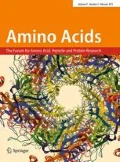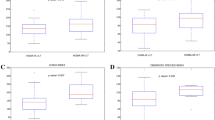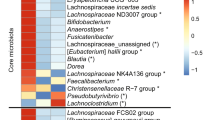Abstract
The amino acids synthesized by the intestinal microbiota have been correlated with metabolic diseases, such as type 2 diabetes mellitus and insulin resistance; both are high incidence conditions in Mexico. However, the knowledge of the relationship of fecal amino acids with the development of both diseases in the Mexican population is scarce. The clinical study was descriptive; the study was carried out in the Antiguo Civil Hospital of Guadalajara. Samples were taken from a total of 48 participants with insulin resistance, diabetes, and a control group (n = 16 each). Anthropometric and biochemical measures were evaluated. HPLC carried out the quantification of fecal amino acids. A strong correlation between alanine and HOMA-IR (r = 0.5416) was found and between phenylalanine and HOMA-IR (r = 0.4258). Other interesting correlations were between alanine and glucose (r = 0.5854) and isoleucine and glucose (r = 0.5008). The diabetic group and the insulin-resistant group had increased fecal values of valine and isoleucine (branched-chain amino acids), which were positively correlated with the progression of both conditions. Likewise, alanine and phenylalanine can help predict the development of the disease in the Mexican population. Registry number: 037/19.




Similar content being viewed by others
References
Ala-Korpela M (2007) Potential role of body fluid 1H NMR metabonomics as a prognostic and diagnostic tool. Expert Rev Mol Diagn. https://doi.org/10.1586/14737159.7.6.761
Alemán-Mateo H, Ruiz Valenzuela RE (2014) Skeletal muscle mass indices in healthy young mexican adults aged 20–40 years: implications for diagnoses of sarcopenia in the elderly population. Sci World J. https://doi.org/10.1155/2014/672158
Bonvecchio-Arenas A et al (2015) National Academy of Medicine, pp 127–143. ISBN 978-607-443-515-3
Brotons C et al (2008) Predicción de La Glucemia Basal Alterada y Resistencia a La Insulina Mediante El Uso de Medidas Antropométricas de Adiposidad Central: Estudio PRED-IR. Med Clín. https://doi.org/10.1016/S0025-7753(08)72284-X
Candela M et al (2016) Modulation of gut microbiota dysbioses in type 2 diabetic patients by macrobiotic Ma-Pi 2 diet. Br J Nutr. https://doi.org/10.1017/S0007114516001045
Cruz-Jentoft AJ, Sayer AA (2019) Sarcopenia. Lancet. https://doi.org/10.1016/S0140-6736(19)31138-9
Diabetes and American Diabetes Association (2009) Diagnosis and classification of diabetes mellitus. Diabetes Care 28:S5–S10
Flores-Guerrero JL et al (2019) Concentration of branched-chain amino acids is a strong risk marker for incident hypertension. Hypertension 74(6):1428–1435. https://doi.org/10.1161/HYPERTENSIONAHA.119.13735
Granado-serrano AB et al (2019) Faecal bacterial and short-chain fatty acids signature in hypercholesterolemia open. Sci Rep. https://doi.org/10.1038/s41598-019-38874-3
Han SJ et al (2018) Association of thigh muscle mass with insulin resistance and incident type 2 diabetes mellitus in japanese americans. Diabetes Metab J. https://doi.org/10.4093/dmj.2018.0022
Instituto Nacional de Salud Pública (2020) “Encuesta Nacional de Salud y Nutrición 2018–19. Publicaciones del Instituto Nacional de Salud Pública. Instituto Nacional de Salud Pública, Cuernavaca
Jacobsen SS et al (2020) The quality of dietary carbohydrate and fat is associated with better metabolic control in persons with type 1 and type 2 diabetes. Nutr J. https://doi.org/10.1186/s12937-020-00645-6
Janssen-Aguilar R, Nina Mendez FMS, Laviada-Molina HA (2018) Circunferencia de Brazo: alternativa Para La Predicción de La Resistencia a La Insulina. Rev Mex Endocrinol Metab Nutr 5:5
Karlsson FH et al (2013) Gut metagenome in european women with normal, impaired and diabetic glucose control. Nature 498(7452):99–103
Krebs M et al (2007) The mammalian target of rapamycin pathway regulates nutrient-sensitive glucose uptake in man. Diabetes. https://doi.org/10.2337/db06-1016
Lee JJ et al (2016) Association of changes in abdominal fat and cardiovascular risk factors. J Am Coll Cardiol 68(14):1509
Ley RE, Peterson DA, Gordon JI (2006) Ecological and evolutionary forces shaping microbial diversity in the human intestine. Cell 124(4):837–848
Li M et al (2016) Integrative analysis of metabolome and gut microbiota in diet-induced hyperlipidemic rats treated with berberine compounds. J Transl Med. https://doi.org/10.1186/s12967-016-0987-5
Lynch CJ, Adams SH (2014) Branched-chain amino acids in metabolic signalling and insulin resistance. Nat Rev Endocrinol. https://doi.org/10.1038/nrendo.2014.171
Mahtarin R, Ahmed N, Anmona W (2018) Fatty foods and calorie intake of cardiovascular patients. JNHFE. https://doi.org/10.15406/jnhfe.2018.08.00290
Newgard CB et al (2009) A branched-chain amino acid-related metabolic signature that differentiates obese and lean humans and contributes to insulin resistance. Cell Metab. https://doi.org/10.1016/j.cmet.2009.05.001
Org E et al (2017) Relationships between gut microbiota, plasma metabolites, and metabolic syndrome traits in the METSIM cohort. Genome Biol. https://doi.org/10.1186/s13059-017-1194-2
Palmer ND et al (2015) Metabolomic profile associated with insulin resistance and conversion to diabetes in the insulin resistance atherosclerosis study. J Clin Endocrinol Metab. https://doi.org/10.1210/jc.2014-2357
Pedersen HK et al (2016) Human gut microbes impact host serum metabolome and insulin sensitivity. Nature 535(7612):376–381
Perez-Lizaur AB, Palacios-González B, Catro-Becerra AL (2008) Mexican institute of social security coordination of high specialty medical units. Clinical practice guideline code: IMSS-684-13, pp 11–43
Qin J et al (2012) A metagenome-wide association study of gut microbiota in type 2 diabetes. Nature 490(7418):55–60. https://doi.org/10.1038/nature11450
Reyes ME, Martínez HEM, Ortega GC, Arce SL, Zamora ER (2017) Valores de Referencia de HOMA-IR y QUICKI Durante El Embarazo En Mujeres Mexicanas TT-HOMA-IR and QUICKI reference values during pregnancy in Mexican women. Ginecol y Obstet De Méx 85:306–313
Rudenko O et al (2019) The aromatic amino acid sensor GPR142 controls metabolism through balanced regulation of pancreatic and gut hormones. Mol Metab. https://doi.org/10.1016/j.molmet.2018.10.012
Ruiz-Canela M et al (2018) Plasma branched chain/aromatic amino acids, enriched mediterranean diet and risk of type 2 diabetes: case-cohort study within the PREDIMED trial. Diabetologia. https://doi.org/10.1007/s00125-018-4611-5
Saavedra MO et al (2012) Revista Mexicana colesterol: función biológica e implicaciones médicas cholesterol: biological function and medical implications. Rev Mex de Cienc Farm 10:346–352
Salazar MR et al (2013) Comparison of the abilities of the plasma triglyceride/high-density lipoprotein cholesterol ratio and the metabolic syndrome to identify insulin resistance. Diabetes Vasc Dis Res. https://doi.org/10.1177/1479164113479809
Salud (1985) World Health Organization. Technical report series; 724. Joint FAO/WHO/UNU Consultative Meeting of Experts on Energy and Protein Needs (1981: Rome, Italy), pp 120–220. ISBN 9243207245
Sherwani SI et al (2016) Significance of HbA1c test in diagnosis and prognosis of diabetic patients. Biomark Insights 11:95
Solis GRQ, Hernandez HY (2013) I. Norma Oficial Mexicana Nom-037-Ssa2–2012, Para La Prevención, Tratamiento y Control de Las Dislipidemias. Rev Mex de Cardiol 24:S3–S22
Son JW et al (2017) Low muscle mass and risk of type 2 diabetes in middle-aged and older adults: findings from the KoGES. Diabetologia. https://doi.org/10.1007/s00125-016-4196-9
Suárez-Carmona W, Sánchez-Oliver A (2018) Índice de Masa Corporal: Ventajas y Desventajas de Su Uso En La Obesidad. Relación Con La Fuerza y La Actividad Física. Nutr Clin Med XII:129–139
Thursby E, Juge N (2017) Introduction to the human gut microbiota. Biochem J 474(11):1823–1836. https://doi.org/10.1042/BCJ20160510
Unger G, Silvia FB, Fernando P, Graciela LP (2014) Índice Triglicéridos y Glucosa: Un Indicador Útil de Insulinorresistencia. Endocrinol Nutr. https://doi.org/10.1016/j.endonu.2014.06.009
Uppal S (2016) Evaluation of postprandial to fasting insulin ratio as a biochemical marker of insulin resistance in obese Indian children. Endocrinol Int J 3:52–56. https://doi.org/10.15406/emij.2016.03.00048
Vázquez Chávez S et al (2003) ¿Cuál Es El Nivel de Insulina En Una Población Mexicana En Peso Ideal? Rev De Endocrinol y Nutr 11:22–27
Wiklund P, Zhang X, Tan X, Keinänen-Kiukaanniemi S, Alen M, Cheng S (2016) Serum amino acid profiles in childhood predict triglyceride level in adulthood: a 7-year longitudinal study in girls. J Clin Endocrinol Metab 101:2047–2055
Yatzidis H (2004) Oral supplement of six selective amino acids arrest progression renal failure in uremic patients. Int Urol Nephrol 36(4):591–598
Funding
No funding was received for conducting this study.
Author information
Authors and Affiliations
Contributions
MPM-A: study and design, development and methodology, data collection, data analysis/interpretation, writing of all manuscript sections. LV-C and EDB-Á: study, design, and data collection. RAG-R: development and methodology. MA-Z: review of the manuscript. MG-A: approved the version to be published.
Corresponding author
Ethics declarations
Conflict of interest
No conflict of interest.
Ethical statement
The undersigned declare that this manuscript is original, has not been published before, and is not currently being considered for publication elsewhere. We confirm that the manuscript has been read and approved by all named authors and that there are no other persons who satisfied the criteria for authorship but are not listed. We further confirm that all have approved the order of authors listed in the manuscript of us. We understand that the Corresponding Author is the sole contact for the Editorial process. She is responsible for communicating with the other authors about progress, submissions of revisions, and final approval of proofs. I (corresponding author) agree with the above statements and declare that this submission.
Additional information
Handling editor: F. Blachier.
Publisher's Note
Springer Nature remains neutral with regard to jurisdictional claims in published maps and institutional affiliations.
Rights and permissions
About this article
Cite this article
Macías-Acosta, M.P., Valerdi-Contreras, L., Bustos-Angel, E.D. et al. Involvement of the fecal amino acid profile in a clinical and anthropometric study of Mexican patients with insulin resistance and type 2 diabetes mellitus. Amino Acids 54, 47–55 (2022). https://doi.org/10.1007/s00726-021-03107-3
Received:
Accepted:
Published:
Issue Date:
DOI: https://doi.org/10.1007/s00726-021-03107-3




